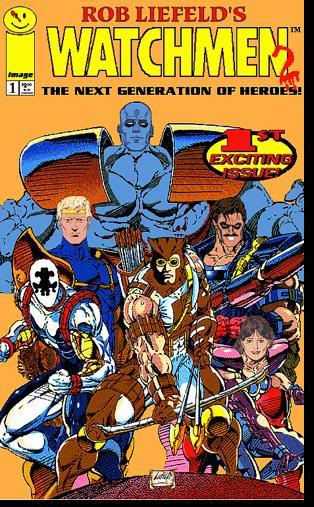#February2010
Watchmen 2 Be Desecrated

If Ben Kenobi didn’t make his noble sacrifice, he’d be sensing an unprecedented disturbance in the Force right now – as though millions of geeks were crying out, only to be silenced.
Word started spreading today that Dan DiDio, Executive Douchebag of DC Comics, is going ahead with plans to publish multiple series and projects based on Watchmen. Apparently Paul Levitz, former Decent Publisher and Respectful Fellow of DC Comics, had repeatedly turned down proposals to create spin-offs based on Watchmen out of a respect for Alan Moore (the kook/genius responsible for writing the series). Now that Levitz is out of the picture, DiDio is willing to cash-in on the DC-owned property, with nary a regard for the wishes of its original creators.
I believe that Watchmen is the greatest fictional narrative I have ever experienced, a perfect work of unparalleled excellence. As such, I understand that any attempts to capitalize on its reputation could never affect the power of the original series itself. But I can’t help get but pissed off when I think of schmohawks using my favorite piece of literature as means to sell bullshit crossover series, coffee mugs, and action figures. (Especially when the series lampoons such flagrant cash-grabs).
I dropped a post over at Warren Ellis’ Whitechapel forum, hoping to elicit response from the rare breed of nerd I call those whose opinions I value. To my delight, Warren offered his two cents:
Finding someone to work on it will be interesting. It’s not as cut and dried a thing as, say, working on an old Stan-and-Jack property.
And this got me thinking — What type of fucking asshole actually signs on to write/pencil/ink/color/letter/edit Watchmen 2? I’ve arrived at two answers; 1) A greedy fuck who doesn’t care about besmirching the legacy of the seminal work of the comics medium as long he’s paid well. 2) An arrogant prick who (laughably) thinks he’ll be able to live up to the standards of Watchmen.
This is fucked. I understand that the comic book industry is fucking shameless, more of a research & development department for the Movie/Cartoon/Toy Industry than an artistically-minded field. But I guess my inner optimist is deflated to realize that nothing is sacred anymore.
Who’s going to watch the Watchmen? Anyone that wakes up before 9AM on a Saturday.
Warren Ellis is a [Shivering] Genius
Warren Ellis is my goddamn hero.
In case you don’t have a clue, Warren Ellis is pretty much the comic industry’s best mad scientist. Not only is Ellis responsible for some of the best creator-owned properties of all time (Transmetropolitan & Doktor Sleepless come to mind), but he also pushes well-established properties into more compelling storylines. I’ve spent the last few years fawning over Ellis’ writing, going as far as to write a twenty-four page research paper exploring the implications of hyperreality in Doktor Sleepless.
But more than just the scribe behind some great funnybooks, Warren Ellis always has something interesting to say. Through his website, weekly columns and forum, the mad Englishman (aren’t they all?) offers a brand of insight that can only be understated as unique. Without reservation, Ellis tackles what he believes to be the trends/technologies/perspectives of the future while examining the precedents to which we so desperately cling.
For your pleasure, one of my favorite excerpts from Ellis’ 2001 collection of short essays/posts, Come in Alone:
Fuck superheroes, frankly. The notion that these things dominate an entire genre is absurd. It’s like every bookstore on the planet having ninety percent of its shelves filled by nurse novels. Imagine that. You want a new novel, but have to wade through three hundred new books about romances in the wards before you can get at any other genre. A medium where the relationship of fiction about nurses outweighs mainstream literary fiction by a ratio of one hundred to one. Superhero comics are like bloody creeping fungus, and they smother everything else. (p. 78)
Clearly, Warren Ellis is a creator devoted to the medium of comic books rather than the industry. And that’s a sentiment to which all artists should aspire.
Last week it was brought to my attention that pre-orders were being taken for Shivering Sands, Ellis’ new collection of essays, rants, reviews and other musings. At first glance, I figured that I would just snag the paperback at a bookstore; but then I realized that Shivering Sands is only available online. The author is experimenting with print-on-demand (yes, it is exactly what it sounds like) and therefore offering his newest compilation through Lulu. More than willing to give my (barely) hard-earned cash to Ellis, I ordered immediately and began anticipating the delivery.
My copy of Shivering Sands arrived last night. Despite being inundated with work, I have already blasted through the first sixty-some-odd pages. Seriously, I wish that I hadn’t already finished the media-component of my English degree because I would walk into the classroom wielding this book like Mjöllnir and smashing shit up with a ferocity that would make Thor piss his God-sized underoos. The examinations of technology and media are fucking mindblowing, delving into the notion (also found throughout Doktor Sleepless) that we are actually living in “the future,” but are incapable of recognizing it as such.
Another early highlight is found in Microcast, a January 2004 theorizing of why 2003 was an absolute dud in terms of mainstream entertainment/art. Ellis posits that niche broadcasting and narrowcasting in the digital era allows for the user to reverse the once unilateral transmission of information; in other words, users are now looking for what they want to find rather than accepting what they are given.
Ellis muses,
The mass audience is breaking down into smaller sets; and beyond that, into what Dr. Joshua Ellis (no relation) terms ‘taste tribes’ — people whose group status is defined by their particular cultural apprehension. Where one says, I know and interact with this person on the initial basis that we share tastes. Not that we all trade notes on Star Trek — not a fan thing — but that we share a cultural sphere. This creates and defines a loose community of its own, stitched together by cultural communication. And with the net in place, taste tribes are borderless. (p. 40)
I’m not even finished with Shivering Sands but I’m going to suggest that you purchase it. If you’re at all interested in comic books, media theory, chemically-induced diatribes, supporting great artists or just finding something with which to pass some time, check this book out.
Moore Wisdom

The people at some website called Mania.com have just put out the second installment of an interview with Alan Moore, acclaimed writer of every fucking comic book taken seriously. So far, it is a really interesting read – checking out the perspectives of a man who has done more to alter the course of the comic book medium while simultaneously lambasting its industry.
While I’m not going to regurgitate the entire article, I am going to present one of my favorite excerpts. In this bit, Moore discusses the perversion that is comic book fandom’s loyalty to static, well-worn properties over the creators striving to do something unique and challenge the limits of imagination.
I remember somebody in one of the fanzines over here saying, “Well, why don’t we just not buy any Marvel comics until they give Jack Kirby what he deserves.” I thought, “Yeah, that sounds good. I’ll do that.” And, that was when I stopped buying Marvel comics. I think in the next issue of the fanzine, someone said, “Uh, yeah, but fans are never going to do that, are they?” And, as it turns out, he was right. But, they could’ve done it, if they’d really cared–not if they’d cared for the Hulk, but for the person who created the Hulk; not if they cared for Spider-Man, but if they’d cared for Steve Ditko. They could’ve protested, just once–even if that was only by not buying comics that were substandard or had got ugly practices with how their creators were handled. The whole of the industry, from top to bottom, does have a certain amount of responsibility for its decline.
This is the voice of a man who knows what is truly good for comics. People read Warren Ellis’ Do Anything and discard it as half-baked philosophy. These same folks write off The Dark Knight Strikes Again as Frank Miller’s failed attempt to recapture greatness (anyone who’s read Eisner/Miller understands that FM was deliberately refuting his past work). And I’m sure that Alan Moore’s most recent comments will be shrugged off, explained away as the “semi-coherent musing of a fucked up snake-deity worshipping old man.”
Actually, that explanation isn’t wrong. But neither is Alan Moore.
Welcome To The Future – Supereyes!

As I mentioned before, the “Welcome to the Future” category is based off of inspiration from reading Warren Ellis’ Doktor Sleepless. It seems fitting then, that it appears his crazy insight is about to become true. In DS, there is the Clatter. What is the Clatter? Peep it:
Clatter is a wireless IM Lens instant messaging system built on to a soft contact lens. Clatter differs from other, commercial lens services by being open source and “riding” other services to create free cross-platform access.
It was created by John Reinhardt/Doktor Sleepless before he left for the Amazon.
Shriekygirls piggyback their shriekyware connections on Clatter signals.
In other words, it’s an instant messaging system that you see in front of you. This is futuristic sci-fi nonsense, right?
Not according to this news article at the IEEE Spectrum:
In the Terminator movies, Arnold Schwarzenegger’s character sees the world with data superimposed on his visual field–virtual captions that enhance the cyborg’s scan of a scene. In stories by the science fiction author Vernor Vinge, characters rely on electronic contact lenses, rather than smartphones or brain implants, for seamless access to information that appears right before their eyes.
These visions (if I may) might seem far-fetched, but a contact lens with simple built-in electronics is already within reach; in fact, my students and I are already producing such devices in small numbers in my laboratory at the University of Washington, in Seattle [see sidebar, “A Twinkle in the Eye”]. These lenses don’t give us the vision of an eagle or the benefit of running subtitles on our surroundings yet. But we have built a lens with one LED, which we’ve powered wirelessly with RF. What we’ve done so far barely hints at what will soon be possible with this technology.
Welcome to the motherfucking future. Where you’ll be able to see like the Terminator, and chat with your friends while you close your eyes waiting for sleep.
Getting All Derrida On Superman’s Ass

With the news trickling out that Warner Brothers is losing the rights to key ingredients of the Superman formula, I began contemplating what exactly comprises Superman. I was taking this into consideration alongside the recent developments where protégés began donning the mantle of their fallen Jedi Masters and shit. You have Dick Grayson traipsing about as Batman. And at least for a new months, you got Bucky running around as Captain America.
So I got to thinking. It was bothering me. On the toilet. In bed. In the shower. I asked myself, what is the essence of Superman? Does he exist outside of the tenants of his history? Is the soul of Superman tied into Krypton, into the Lois Lane/Clark/Superman love triangle? Can you have a Superman that isn’t from Krypton? What defines Superman as Superman, and furthermore, does it even matter? Can the term stand for multiple things, for different creators?
I don’t have any answers, but I think it’s a worthy examination.
Let’s kick it by taking on Dick Grayson and Bucky Barnes. When DC was contemplating killing off Batman, the general shtick was this: Batman was more than a man, he was a symbol. Even if an Uber Alien Bullet vaporized Bruce Wayne, Grayson could continue to carry on what he stood for. Same thing goes for Bucky. Maybe Captain America got his ass seriously capped on some court steps. But he had someone else to pick up the job. Albeit with a sweet metallic arm, but still, there was someone else to pick up the job.
However, both instances were circumstances different than what is currently going on with good ole’ Clark Kent. How so? Well for starters, we’re talking about a world without Clark Kent. Warner Brothers, if I am understanding correctly, is losing the rights to that very name.
Let’s call Bucky and Dick “The Replacements” throughout the rest of this article for ease of statement.
When The Replacements stepped into the costumes, they were inheriting mantles. Bucky wasn’t redefining a symbol. Rather, he was reinterpreting it. The Replacements ran parallel to the fallen dudes they were replacing. All of their experiences in assuming the roles were predicated on the conscious fact that they were replacing someone, and what their predecessor stood for.
How many times did something along the lines of this came up:
Oh well Bruce/Steve wouldn’t have wanted me to do this, blah blah.
The idea that Captain America is a symbol, at least currently in the Marvel universe, stems from the fact that there was someone to define this symbol prior to Bucky.
There was these two parallel constructions: What Batman/Captain America stood for, and what The Replacements did by assuming this symbol. Not by defining it.
So I began to ask, what if you removed the initial construction, the defining of the symbol prior to the assumption of the mantle?




